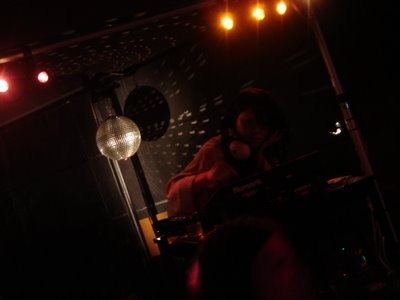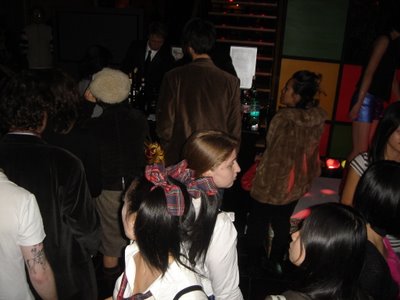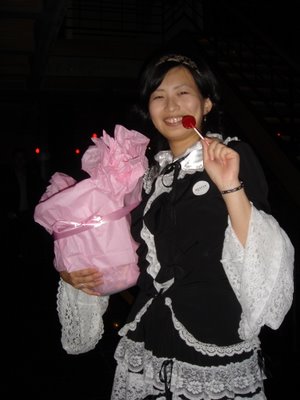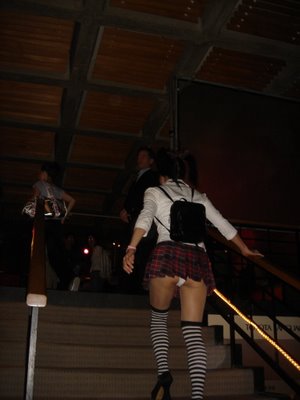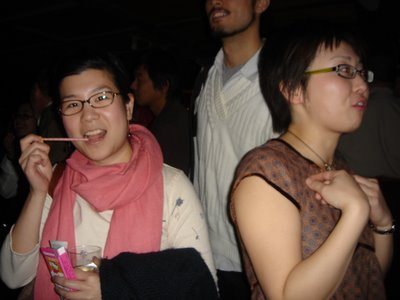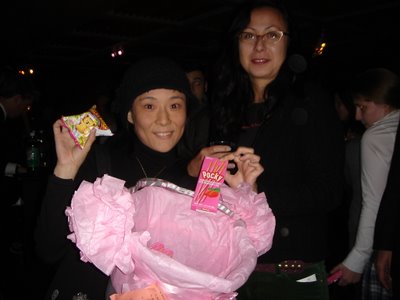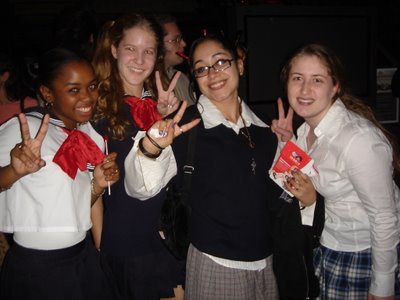Lollipops
 Friday night was the opening night film and party of Japan Society's "Lolita in Full Bloom" film series, here in New York. This program - part of a larger, ongoing arts and culture series called "Girl, Girly, Girlish" - includes five popular Japanese films from the 1980s, all starring popular girl "idols" (young pop stars, but also movie/photo icons) of the period. These films are rarely screened in the US, and the JS program is a real opportunity for fans of popular Japanese cinema to get a taste of what audiences, particularly young people, were watching at that particular time. None of the films are available on US video, although some of them have come out with English subtitles on DVD in Hong Kong, with a few more forthcoming.
Friday night was the opening night film and party of Japan Society's "Lolita in Full Bloom" film series, here in New York. This program - part of a larger, ongoing arts and culture series called "Girl, Girly, Girlish" - includes five popular Japanese films from the 1980s, all starring popular girl "idols" (young pop stars, but also movie/photo icons) of the period. These films are rarely screened in the US, and the JS program is a real opportunity for fans of popular Japanese cinema to get a taste of what audiences, particularly young people, were watching at that particular time. None of the films are available on US video, although some of them have come out with English subtitles on DVD in Hong Kong, with a few more forthcoming.Last night's film was 1981's Sailor Suit and Machine Gun (セーラー服と機関銃), starring idol Hiroko Yakushimaru as well as Toei yakuza icon Tsunehiko Watase (Battles Without Honor 3, Jeans Blues: No Future), with a special appearance by icon Rentaro Mikuni (The Burmese Harp, Kwaidan, among many others). It was a wild combination of absurdist comedy - the plot is about a high school girl who, through inheritance, becomes the boss of a yakuza family - mixed with equal parts melodrama and bizarro sci-fi or spy movie tropes. Although the idol phenomenon was, and continues to be, a hugely commercial one, spawning music albums, photo books, and all sorts of goods associated with the here today-gone tomorrow idols (both male and female), director Shinji Somai was no hack, bringing an extremely personal touch to the film. He shot and constructed the film as a series of increasingly long takes, which allow master shots to proceed with pairs or even groups of actors delivering dialogue for many minutes without any edits. It's an astonishing thing to watch, especially when Somai also distances the camera from his actors and the drama of the moment, again getting progressively further back as the film goes on. What could easily be considered the most important scene of the film, as the heroine and her yakuza protector part ways on a rooftop after the climactic fight, is shot not only from 500 some feet away, but from almost directly above the scene, from another building! I'm not sure what it means, but it's a wild and totally unique choice on the director's part.
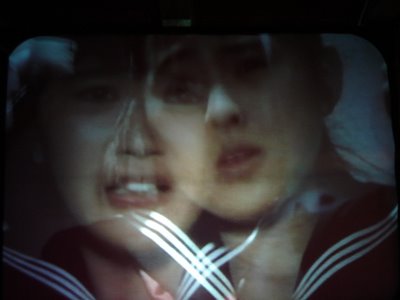 Sailor Suit screens again this Sunday, at 6:15 pm, and it's definitely worth catching on the big screen. But beware: its long-term effects may prove more serious than I'd imagined.
Sailor Suit screens again this Sunday, at 6:15 pm, and it's definitely worth catching on the big screen. But beware: its long-term effects may prove more serious than I'd imagined.Other films in the series include Shinichiro Sawai's W's Tragedy (Wの悲劇), also with Yakushimaru; Somai's Typhoon Club (台風クラブ), with Yuki Kudoh, destined to star in the recent Takashi Miike "Masters of Horror" episode Imprint; and two films by House director Nobuhiko Obayashi: Exchange Students (転校生) with Satomi Kobayashi, and The Little Girl Who Conquered Time (時をかける少女), starring Tomoyo Harada (the source novel was also recently adapted into an animated film). The full film schedule can be found here.
 But even better than the films, or at least more embarrassing, was the fun and very crowded "Lollipop party" that followed the screening, co-sponsored by Japan Society and Elle magazine. Check out the photos below for shots of moviegoers dressed in schoolgirl outfits, DJ Jaiko Suzuki spinning tunes as a professional dancer gyrates, and lots and lots of sweet candy. Enjoy.
But even better than the films, or at least more embarrassing, was the fun and very crowded "Lollipop party" that followed the screening, co-sponsored by Japan Society and Elle magazine. Check out the photos below for shots of moviegoers dressed in schoolgirl outfits, DJ Jaiko Suzuki spinning tunes as a professional dancer gyrates, and lots and lots of sweet candy. Enjoy.
